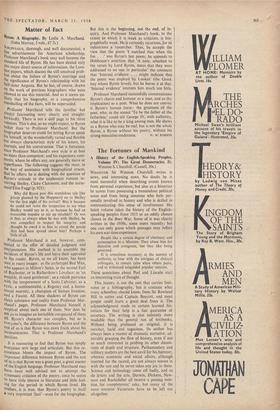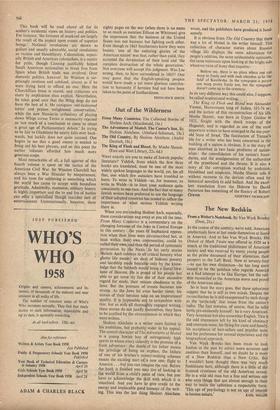The Fortunes of Mankind
A History of the English-Speaking Peoples. Volume IV: The Great Democracies. By Winston S. Churchill. (Cassell, 30s.) WHATEVER Sir Winston Churchill writes is news, and interesting news. No doubt he is most successful when describing events known from personal experience, but also as a historian he scores from possessing a tremendous political sense and from being someone who feels per- sonally involved in history and who is skilled in communicating this sense of involvement. His latest volume takes the history of the English- speaking peoples 'from 1815 to an oddly chosen climax in the Boer War. Some of it was clearly written in the 1930s, some more recently; but one can only guess which passages may reflect his own war-time experience.
People like a certain degree of obstinacy and presumption in a Minister, They abuse him for dictation and arrogance, but they like being governed.
It is sometimes necessary at the summit of authority to bear with the intrigues of disloyal colleagues, to remain calm when others panic, and to withstand misguided popular outcries.
These quotations about Peel and Lincoln start an interesting train of thought.
This history is not the sort that carries foot- notes or a bibliography, but it contains what every schoolboy should know, from Sir Rowland Hill to suttee and Captain Boycott, and most people could learn a great deal from it. The acknowledgment made to certain learned his- torians for their help is a fair guarantee of accuracy. The writing is also infinitely more readable than the general run of textbooks. Without being profound or original, it is succinct, lucid and sagacious. Its author has always been a master of dramatic narrative, ad- mirably grasping the flow of history, even if not so much interested in probing its other dimen- sions of depth and structure.. Parliamentary and military matters are the best anvil for his hammer, whereas economic and social affairs, although inserted for the record, are not always woven in with the rest and he never takes any joy in them. Science and technology come off badly, and so do letters and the arts. Darwin, Dickens, New- man and Rockefeller all receive a passing men- tion for completeness' sake, but many of the most eminent Victorians have to be left out altogether. This book will be read above all for its author's incidental views on history and politics. For instance, 'the fortunes of mankind are largely the result of the impact upon events of superior beings.' National revolutions are shown as gallant and usually admirable, social revolutions as vicious and bloodthirsty. Colonialism, especi- ally British and American colonialism, is a matter for pride, though Canning justifiably helped South American nationalists to break free from Spain when British trade was involved. Over domestic politics, however, Sir Winston is sur- prisingly cautious and subdued, almost as if he were trying hard to offend, no one. Here the Churchillian brass is muted, and criticisms are more by implication than explicit. Nevertheless, he takes good care that the Whig dogs do not have the best of it. He castigates 'old-fashioned tories' and praises 'enlightened conservatism,' while the new Namierite orthodoxy of playing down Whigs versus Tories is summarily rejected as 'not much of a conclusion to come to about a great age of Parliamentary debate.' In trying to be fair to Gladstone he nearly falls over back- wards, but luckily does not quite succeed. One begins to see that a good enemy is needed to bring out his best phrases, and on this point the earlier volumes afforded him much more generous scope.
Most remarkable of all, a full quarter of this fourth volume is spent on the tactics of the American Civil War. Sir Winston Churchill has always been a War Minister by temperament, and his taste for soldiering is something which the world has cause to accept with boundless gratitude. Admittedly, moreover, military history is highly important and the to and fro of battles can offer a specialiked though macabre sort of entertainment. Unintentionally, however, these
eighty pages on the war (when there is no room to so much as mention Edison or Whitman) give the impression that the business of the United States was not business but fighting each other. Even though in 1863 Southerners knew they were beaten, 'one of the enduring glories of the American nation' was that, rather than yield, they accepted the devastation of their land and 'the complete destruction of the whole generation.' Not everyone will accept this judgment. Was Lee wrong, then, to have surrendered in 1865? One may guess that the English-speaking peoples would have made a yet more glorious contribu- tion to humanity if heroism had not here been taken to the point of foolhardiness.
DENIS MACK SMITH



































 Previous page
Previous page